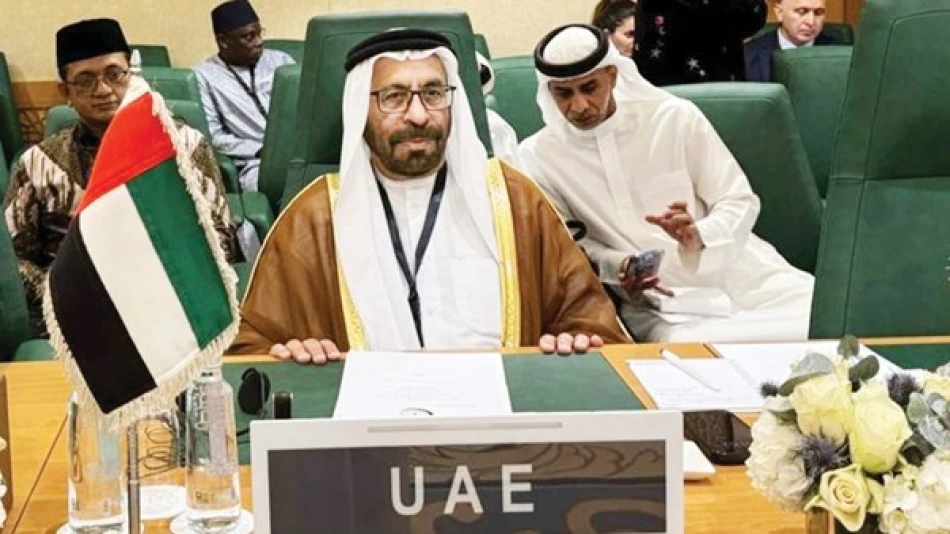
UAE Renews Commitment to Supporting Palestinian Aspirations
UAE Takes Firm Stand Against Israeli Gaza Plans at Islamic Summit
The United Arab Emirates has strongly condemned Israel's plans to invade Gaza and expand settlements, positioning itself as a leading voice for Palestinian rights at an extraordinary meeting of Islamic foreign ministers in Jeddah. The UAE's stance reflects growing regional frustration with Israeli policies and signals a potential shift in Middle Eastern diplomatic dynamics, as the Emirates balances its Abraham Accords relationship with Israel against rising humanitarian concerns in Gaza.
Diplomatic Condemnation at Critical Juncture
At the Organization of Islamic Cooperation's emergency session in Jeddah, UAE Minister of State Khalifa Shaheen Al Marar delivered a scathing critique of Israeli government policies. The UAE rejected what it termed "extremist and illegal policies" by the Israeli government and settlers, calling for unified international action to support the Palestinian people.
The timing of this diplomatic intervention is significant. The UAE's participation in the Abraham Accords in 2020 marked a historic normalization with Israel, making its current criticism particularly noteworthy. This suggests that even Israel's newest Arab partners have limits to their tolerance for military operations in Gaza.
Beyond Rhetoric: Concrete Opposition
The UAE's condemnation went beyond standard diplomatic language. Al Marar specifically denounced Israeli Prime Minister's statements about "Greater Israel" as a "flagrant violation of international law and the UN Charter." This direct challenge to Israeli territorial ambitions represents a hardening of the UAE's position since the Gaza crisis escalated.
Humanitarian Leadership Under Pressure
Despite political tensions, the UAE has emerged as Gaza's largest aid provider, contributing over 44% of all international assistance to the territory since the current crisis began. This massive humanitarian commitment through "Operation Gallant Knight 3" demonstrates the UAE's strategy of maintaining moral authority while navigating complex regional relationships.
Multilateral Aid Operations
The Emirates has coordinated airdrops with European partners including Germany, France, Spain, Italy, Belgium, Netherlands, Denmark, plus Singapore and Indonesia. This multilateral approach mirrors successful UAE humanitarian strategies in Yemen and Syria, where Abu Dhabi has built international coalitions around aid delivery rather than military intervention.
The scale of this operation—delivered by land, sea, and air—showcases the UAE's logistical capabilities and positions it as an indispensable humanitarian actor, even as it criticizes Israeli policies.
Strategic Implications for Regional Order
The UAE's strong stance at the Islamic summit reflects broader regional calculations. By taking leadership on Palestinian issues, the Emirates is positioning itself as a responsible regional power that can balance pragmatic relationships with moral imperatives.
Two-State Solution Momentum
Al Marar emphasized growing international recognition of Palestinian statehood as "not a political choice, but a moral, humanitarian and legal necessity." The UAE joined declarations from the high-level conference co-chaired by Saudi Arabia and France, signaling coordinated Gulf diplomacy on Palestinian recognition.
This represents a calculated shift. While maintaining the Abraham Accords, the UAE is hedging by supporting Palestinian statehood initiatives that enjoy growing European backing. Countries like Spain, Ireland, and Norway have recently recognized Palestinian statehood, creating momentum the UAE appears eager to join.
Balancing Act with Long-term Consequences
The UAE's position reflects the complex reality facing Arab states that normalized relations with Israel. The Abraham Accords were premised on Palestinian issues taking a backseat to shared concerns about Iran and economic cooperation. However, the scale of civilian casualties in Gaza has made this calculus politically unsustainable.
For Israel, losing UAE support—even temporarily—represents a significant diplomatic setback. The Emirates' business-friendly approach and regional influence made it an ideal partner for Israeli economic integration with the Arab world. The UAE's current stance suggests this integration faces serious obstacles if military operations continue.
Regional Precedent
The UAE's approach mirrors strategies used by other small states facing similar dilemmas. Singapore, for instance, has often balanced relationships with larger powers by taking principled stands on international law while maintaining economic partnerships. The UAE appears to be applying similar logic—preserving long-term relationships while establishing clear red lines on humanitarian issues.
This diplomatic positioning could prove prescient if international pressure forces a ceasefire and renewed peace negotiations. The UAE would emerge as a credible mediator with relationships across the divide, potentially enhancing its regional influence while maintaining its humanitarian credentials.
Most Viewed News

 Layla Al Mansoori
Layla Al Mansoori






